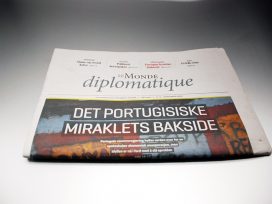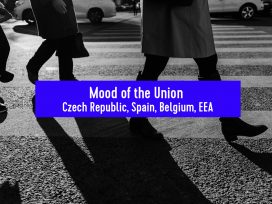Surveillance: A sign of the times
Norwegian Le Monde diplomatique editor Truls Lie looks at the new EU directive on telephone and Internet surveillance through the lens of Michel Foucault’s theory of the Panopticon. Humanity is getting a new self-image, writes Lie, formed by the information, control, and network societies.
Norway is obliged to adhere to the EU’s new surveillance rules. The surveillance of all the websites you visit, the identities of all the people you telephone, text message, or email. Or conversely, the identity of everyone who calls you or sends you an email or a text message. Should I happen to receive a text message from a “suspicious” person, even if it were from a random reader of Le Monde diplomatique – my name would automatically end up on the list. Will the lists that Norway must make available to the FBI include telephone numbers, geographic details of where and when you used your mobile phone, or digital recordings of mobile phone conversations?
Are we really aware of the kind of attitude which is currently prompting such legislation? Can it be called a referendum, voted in by the majority? Similar to an instrument which we tune to the mantra “security, security”?
Allow me to approach the situation, or perhaps more accurately, our environment, by a circuitous route. Our situation is the technical, information, network society itself. I’m talking about our tools, the technical apparatuses that help us. You know them: mobile phones, bank machines, databases. This new digital environment becomes a part of us, like clothes and glasses. This is the body’s new “prosthesis”, the artificial extension of the body. For a few thousand years, we have of course been clever enough to allow objects and techniques to help us. When we were cold, we made clothes. To protect our feet from injury and cold, we bound them and later made shoes. When we couldn’t see properly, we made glasses. We produced small tools and weapons; first flint spearheads, today miniature mobile phones for videoconferences. The alphabet was another intelligent technology we invented – a memory and communication aid. We in the West who work within globalized information and service-based companies – raw, materials-based industry production moves ever further south towards the developing world – are confined to a media world of sound and vision. Our environment is full of attention-grabbing texts and advertisements, as we sit hunched over the PC screen or stretched out in front of the television screen’s scripted conflicts. Just under a million “surveilling” Norwegians read the daily newspaper and watch the news on television. As Marshall McLuhan once said, “The real is the reel”. The film reels whirr over the cerebral cortex – flickering images from magazines, television, cinema, or the day’s urban impressions as you stroll, cycle, or drive along.
We observe. The environment is the object of our attention, our “surveillance”. This is an odd expression, it almost has a positive ring to it, as in the careful watch we keep over our children… The present mentality springs from a tendency in us, the tendency to be watchful and to have an overview of our everyday lives.
Let me be more philosophical, as the situation is complex. The French philosopher Michel Foucault described this mentality in his book Discipline and punish – The birth of the prison.1 The prison is described as a surveillance tower in the midst of all the prison cells – the prisoners could not see if or when they were being watched through the glass of the tower, but nevertheless felt its watchful eye on them at all times. The tower was called Panopticon. The observed could almost recognize the sensation of the eye of God upon them, in the same way many people sense God’s presence in their conscience. Foucault’s aim with this clever apparatus was rather to describe the mentality or the climate that drives people to construct such prisons. Before prison walls, of glass or steel, are erected, humanity must have developed both expressions for, and the means of visualizing them – which can let whatever one describes or outlines be seen and understood. These are sounds and symbols that enhance our understanding, identifiable signs and symbols that distinguish themselves and eventually become recognizable. Historically, established institutions like prisons, hospitals, and schools came into being first as creative concepts, slowly but surely taking shape out of a vague understanding, an amalgamation of the collection of events, thoughts, concepts, and situations which produced them, in the same way as our technical apparatuses, large and small – planes, ships, cars, bicycles, and kitchen appliances. The same is true of digital PCs, mobile phones, cameras, MP3 players, and credit cards that get us “connected”. May I remind you that all of these are “invented”.
For example, criminal law first came into being in the form of a language regime – it was concerned with predictability in terms of criminality, with what could be characterized as punishable. Such a language regime had to classify and “translate” crimes in order to calculate punishments. Through the structuring of language, we have access to reality and practice, through statements and expressions which make the criminal and the crime visible. Panoptism therefore is also defined as a mental light regime, a combination of the dynamic between what can be expressed and what can be seen.
Panoptism is the concept that has degraded the nature of the prison system – exemplified by the US prison industry with its two million inmates, profit-based privately-run prisons, or the extension of the prison concept visible in the country’s widespread use of weapons, within both public and private arenas.
Surveillance came into its own with the advent of the modern state. This was particularly so as around the beginning of the nineteenth century the population developed a new fascination: medical surveillance of diseases and epidemics was linked to a wide range of other types of surveillance – military surveillance of deserters, tax checks on traded goods, administrative supervision of medicines, food rations, missing and deceased persons. Statistics became a new phenomenon and necessity – panoptically many countries were given a “Central Statistics Office”. When something becomes established and ubiquitous it’s all too easy to forget its creation, that things were actually different before.
Surveillance today lends itself to legitimation as a security issue. Language is hugely significant. Norway’s police surveillance service was aware of this when it cleverly changed its name from POT to PST (Politiets SikkerhetsTjeneste – Police Security Service). And when expressions are established, practice follows suit. I’m sure there is no need to mention all the cheap and effective surveillance cameras that are now to be found over sidewalks, at check-outs, in the corners of museums, above traffic, at airports and squares, at border control – and your front door. It’s strange they are not already called “security cameras”. But at the very least you have a security alarm, alarm clock, personal alarm, car alarm, rape alarm, and burglar alarm. And for the sake of your security today we have keyless locks, online banking, and bankcards with PIN codes. The mentality of surveillance and security has imposed a certain conduct on us all for a long time.
That was the circuitous route around the situation. And so to the more concrete. The former British Home Secretary Charles Clarke said in a speech to the EU parliament on 7 September 2005, “States within the European Union must accept the loss of certain civil liberties if their citizens are to be protected against criminality and terrorism.” The July bombings formed the backdrop, an action that was erroneously connected to al-Qaeda.2
Surveillance is not necessarily effective. The surveillance of the Norwegian population’s Internet and telephone use may statistically lead to a multitude of erroneous charges. Even with modern methods based on so-called Bayesian statistics, there will be serious mistakes and attacks on individuals and groups.3 It will lead to a lot of unease – it is not without reason that Norwegian doctors do not demand that the entire Norwegian population is screened for life-threatening illnesses such as HIV/AIDS. In addition, the implementation of the media surveillance proposed by the EU means enormous costs for telecommunications companies and public services – costs that usually end up being paid by the consumer.
Furthermore, the most adept criminals avoid surveillance – they use stolen mobile phones, Internet cafés, or meet up in person. Today it is reckoned that bin Laden (if he’s alive) and his group use “runners” instead of satellite phones. More and more people are using the personal Hawala system instead of traceable bank systems.
Let me add a final summary, because surveillance is here to stay. At this point, I don’t want pass judgement on the sacredness of private life, or promote unadulterated, anti-authoritarian anarchistic perspectives.
Our self-image is in flux. Let me make another brief reference to Foucault: throughout the eighteenth and nineteenth centuries, Europeans had a self-image or a self-awareness strongly characterized by religion – one saw oneself in God’s image. They grew up with the Bible, with Eternity, and with the notion of omnipotence as a frame of reference. It was only with the industrialization of the twentieth century that this omnipotence came into its own – with Nietzsche’s declaration of the death of God, with science, secular society, the republic, and the factory. Human power was confronted with life itself, with the merger of language, industry, work, and production.
This modern “human form” was not there in the classical era – so why shouldn’t we now, in 2006, experience the establishment of a new form of humanity? Isn’t the modern human like a face in the sand, between high and low tide, on the verge of being erased again?
The new self-image is a form of humanity that is composed of the information, control, and network societies. It is the cyber-human with all the prostheses I have mentioned – the human machine full of information that rapidly plugs into networks and globalization. This third human form is knowledge-thirsty, hungers for images, films, change, transformation. Its situation is often called liquid modernity (Zygmunt Bauman). But I prefer the term transmodern. The prefix “trans” is infinitely more descriptive of our time – listen with your globalized English ears: transactions, transatlantic, transcend, transcribe, transfer, transfiguration, transform, transfusion, transience, transit, transitory, translate, transmigrate, transmit, transmutable, transparence, transplant, and transport.
Human machine, human network, and human transformation. Yes, I know that we’re not there yet. But remember that when Karl Marx described industrialism, he lived in an agricultural European society – there were barely a hundred factories.
We will not be able to avoid assuming this third human form. But with surveillance, today’s control society, and our own self-image interconnected with these digital prostheses and the daily media influence, this is a human form which we ourselves are unable to gain an overview of, let alone “monitor”. This situation will be significant for the ways in which we interpret private life – between protecting ourselves from others and willingly disclosing ourselves. It will also be significant for how we understand property, copyright, family, school, defence, prisons, nations – institutions in ever-spiralling crisis and therefore flux.
It is not necessarily the experience of terrorism alone that drives the EU’s directive. Just like the Panopticon, it would not have been possible without the mentality the third human form has produced.
Michel Foucault, Discipline and punish -- The birth of the prison. Gyldendal Publishers 1977, 1994, 1995, 1999 -- French original 1975.
See the front page of The Observer, 9 April 2006.
See the EFN (Elektonisk Forpost Norge) homepage www.efn.no for more on the EU Commission's directive.
Published 20 June 2006
Original in Norwegian
Translated by
Nicole M. Fishlock
First published by Le Monde diplomatique (Oslo) 6/2006 (Norwegian version)
Contributed by Le Monde diplomatique (Oslo) © Truls Lie/Le Monde diplomatique (Oslo) Eurozine
PDF/PRINTNewsletter
Subscribe to know what’s worth thinking about.



